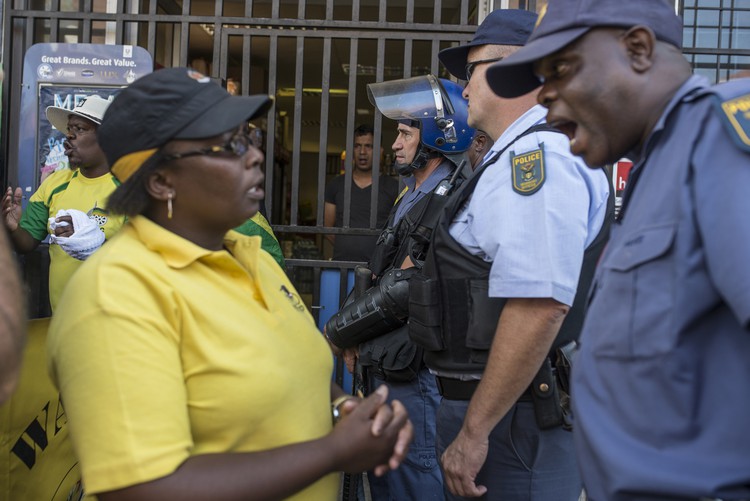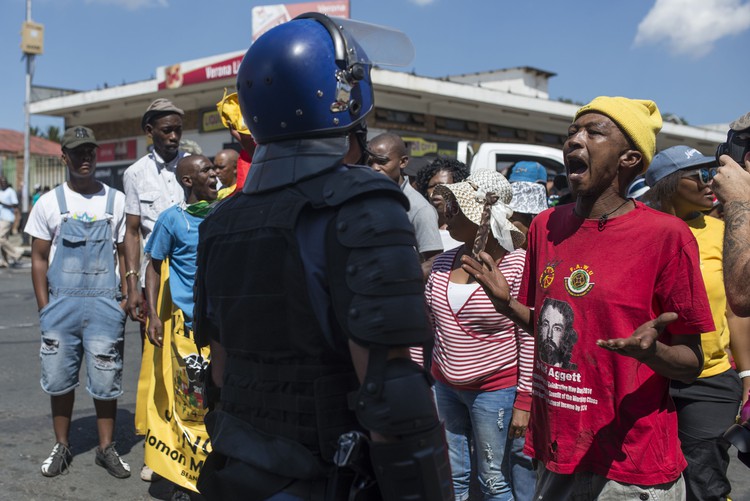Police stop anti-immigrant march in Rosettenville
“No houses will be burnt today. No shops will be looted. We will not allow such to happen.”
Residents of Rosettenville who wanted to hold a protest march in the suburb south of Johannesburg were frustrated after police denied them permission to proceed on Saturday. The protesters, who claimed to be mobilising against “drugs, prostitution, property theft and brothels”, were met by a large contingent of both the Metro Police and South African Police Service (SAPS) on Verona Street where their march was scheduled to start.
In February ten houses were torched by residents who alleged that the homes were used as brothels and drug dens, leading to rising tensions between locals and immigrants living in the area.
The protest was led by members of the Reclaim Our Community Movement who insisted that their fight was against “drugs and prostitution” and not against foreigners. However a poster distributed by the demonstrators showed that one of their grievances was “undocumented, untraceable people posing a danger to the community.”
With the recent xenophobic tension in the area police were adamant that the march was not to proceed under any circumstances. Leaders of the movement met with police as protesters continued to demonstrate on the side of the road without being able to move. Godfrey Mrouongwana one of the protest leaders was instructed by police to communicate with protesters that they should disperse peacefully as they have no permission to gather or march. “The police have told us to go home to disperse from here,” Mrouongwana told the crowd who reacted negatively to the announcement by swearing at the police stationed across the road.
The protesters turned around and moved in a group into the suburb while being followed by the police. A group of riot police then blocked the group preventing them from proceeding any further. Protesters claimed that they were dispersing to their homes while police insisted that no groups of people would be allowed to roam the streets. Immigrant shops in the vicinity had either closed completely or were operating through closed burglar bars. “No houses will be burnt today. No shops will be looted. We will not allow such to happen,” said a commanding police officer in a discussion with a protest leader.
Some protesters ignored the instructions of the police and began proceeding which led to SAPS members releasing stun grenades and a volley of rubber bullets which sent the group scattering in all directions. Police then moved into the suburb chasing down some protesters, but they were too quick and managed to get away without being arrested.

Protesters later regrouped and accused the police of firing on unarmed people. “These are the same police who are benefiting from the prostitution in this area because they visit the brothels for free,” claimed one female protester.
Steven Banda, an immigrant watching the protesters from the safety of his home, said that things like drugs and crime were indeed pressing issues in the suburb which affected all who live in it and so he agreed with the protesters on that. However he said that when groups of people gather like this violence tends to escalate very quickly with foreign nationals being the easiest targets.
The demonstrators dispersed into smaller groups while police continued to maintain a large presence in the area driving around the streets in convoys sometimes stopping and searching for weapons and drugs.
Support independent journalism
Donate using Payfast

Don't miss out on the latest news
We respect your privacy, and promise we won't spam you.
Next: Immigrants in Imizamo Yethu: no relocation from community “we are used to”
Previous: Cape court to deliver vital environmental judgment
© 2017 GroundUp. 
This article is licensed under a Creative Commons Attribution-NoDerivatives 4.0 International License.
You may republish this article, so long as you credit the authors and GroundUp, and do not change the text. Please include a link back to the original article.

